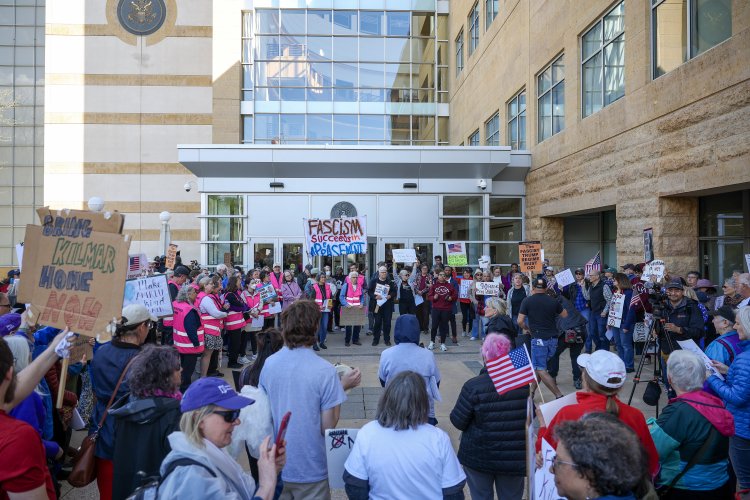Judge initiates investigation into Trump administration's decision not to request the return of mistakenly deported individual
The current record reveals a lack of action taken so far. "To date, what the record shows is that nothing has been done. Nothing," stated U.S. District Judge Paula Xinis.

“To date, what the record shows is that nothing has been done. Nothing,” U.S. District Judge Paula Xinis stated during a court hearing on Tuesday.
Xinis’ ruling initiates a fast-paced inquiry that may compel high-ranking Trump administration officials to testify under oath regarding their response to court orders that require them to help facilitate Kilmar Abrego Garcia’s return to the United States. The judge emphasized that each day that goes by means another day Abrego Garcia remains improperly detained in a maximum security mega-prison.
“We’re going to move. There will be no tolerance for gamesmanship or grandstanding,” the judge asserted. “There are no business hours while we do this. … Cancel vacations, cancel other appointments. I’m usually pretty good about things like that in my court, but not this time. So, I expect all hands on deck.”
This inquiry represents the latest chapter in a growing conflict between the executive and judicial branches regarding Abrego Garcia’s unlawful deportation last month. Xinis had previously ordered the administration to “facilitate” his release from El Salvador custody, a directive the Supreme Court upheld last week.
Officials from Immigration and Homeland Security have conceded that they erroneously deported Abrego Garcia to El Salvador, violating a 2019 court order that prohibited his deportation due to the risk of being targeted by local gangs. Nevertheless, the administration appears to have taken no substantive action to rectify the situation. Instead, Trump administration officials claim they lack the authority to intervene now that he is under El Salvadoran jurisdiction.
Xinis termed their refusal “stunning,” although she acknowledged there exists a valid legal debate surrounding her ability to order U.S. officials to make a formal request to their Salvadoran counterparts.
In her written order for “expedited discovery,” Xinis specified that four senior officials from the Department of Homeland Security and the Department of State are required to undergo depositions by April 23. These depositions will consist of out-of-court interviews in which the officials must respond to questions under oath posed by Abrego Garcia’s attorneys. Among those required to testify are Joseph Mazzara, acting general counsel at Immigration and Customs Enforcement, and Michael Kozak, senior official in the State Department’s Bureau of Western Hemisphere Affairs.
Additionally, Xinis’ order authorizes Abrego Garcia’s legal team to undertake further fact-finding measures, including requesting relevant documents from the government about the case.
Justice Department attorney Drew Ensign claimed that a joint appearance by President Donald Trump and Salvadoran President Nayib Bukele in the Oval Office highlighted that the issue was raised at “the highest authority” in El Salvador, indicating there was no chance of retrieving Abrego Garcia.
However, Xinis pointed out that Bukele’s comments were in response to a journalist’s question and not initiated by a U.S. official. She dismissed Bukele’s remark about being unable to “smuggle” Abrego Garcia back as “non-responsive” in a legal context.
The Trump administration's reliance on that exchange, she remarked, underscored her need for sworn testimony and additional facts.
The Justice Department is expected to introduce various legal barriers to the depositions, including claims of confidentiality regarding executive branch discussions and legal advice. Ensign voiced objections to any fact-finding efforts by the court and requested time for the administration to appeal Xinis’ interpretation of the U.S. government's responsibilities.
Nonetheless, Xinis pointed out that the Supreme Court had made it “very clear” that the U.S. government is obligated to work towards Abrego Garcia’s release from custody in El Salvador.
“I’m cleaving as closely as one can cleave to the Supreme Court,” Xinis told Ensign. “There is, in my view, nothing to appeal. Now, we get to the facts.”
Abrego Garcia, originally from El Salvador, entered the U.S. without authorization around 2011 at approximately 16 years of age to escape gang violence, according to his lawyers. Prior to his deportation last month, he was residing in Maryland with his wife and children, all of whom are U.S. citizens. He has no criminal record and worked as a sheet metal worker.
The Trump administration has claimed that he is affiliated with the violent Salvadoran gang MS-13, referencing an immigration-court proceeding in 2019. Xinis has described the evidence of any gang involvement as extraordinarily weak, consisting of merely a tip from a confidential informant and the fact that Abrego Garcia wore Chicago Bulls merchandise.
On Tuesday, the White House heightened its rhetoric about Abrego Garcia. White House Press Secretary Karoline Leavitt accused him of being “engaged in human trafficking,” despite not having been charged with any crime and with no publicly disclosed evidence to back that allegation. Leavitt further ridiculed media coverage of the case, suggesting that reporters were proposing he should be nominated for “father of the year.”
On the same day, the administration articulated a new stance regarding what it would do if Abrego Garcia were released from the El Salvador prison and returned to the U.S. Mazzara, ICE’s acting general counsel, indicated in a court filing right before the hearing that the U.S. government would detain Abrego Garcia again and seek to deport him to another country or aim to “terminate” the 2019 court order that prevented his deportation to El Salvador.
Abrego Garcia’s attorney, Rina Gandhi, informed Xinis that the Trump administration is obstructing efforts to comply with clear court orders aimed at facilitating her client’s return.
“The government has not even unambiguously requested his return,” Gandhi stated, emphasizing that such requests are routinely made by the government in immigration matters. “The government routinely seeks return by taking low-level actions outside the United States that do not implicate foreign policy.”
Lucas Dupont for TROIB News












